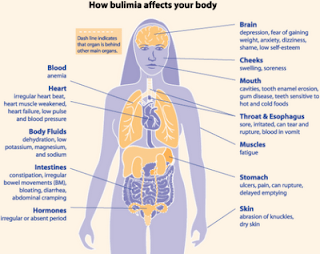Bulimia nervosa or eating disorders bulimia, is an eating disorder. Anyone who has bulimia binge in the periods and at the same time trying to lose weight. It is often difficult for the environment to detect the disease. Do not hesitate to seek professional help if symptoms of eating disorders bulimia.
Eating Disorders Bulimia is an eating disorder that mostly affects girls and young women aged 15-25 years, but in rare cases can affect boys and young men. Bulimia nervosa is together with anorexia nervosa, the most common eating disorder in young people.
Anyone who has
eating disorders bulimia in times when you feel a strong desire for food and candy. This occurs while trying to lose weight. There is a strong conflict between the desire for food and the desire to lose weight.
To cope with this conflict provokes be vomiting or using laxatives maybe after binge eating. Often it involves dieting, fasting and exercise excessively. Binge eating periods are often accompanied by strong feelings of shame. For those with
eating disorders bulimia hangs confidence closely with body shape and weight.
There are similarities between bulimia nervosa and anorexia nervosa in terms of the fear of becoming fat and desire to lose weight. It is not unusual for anorexia nervosa turns into bulimia. About half of those who have had anorexia may then bulimia. Permits may also overlap.
Often the problems begin in adolescence to be getting more and more interested in their weight and make repeated dieting attempts. After a while, you lose control of the situation and eating provokes intense anxiety.
There are probably several reasons for the disease: psychological, biological and social. Cultural relations with the sleek, feminine beauty ideals we in the West can also affect the perception of our own body. There are studies showing that disruption of family relationships can be a contributing factor. Difficult periods or events puberty, death or a family crisis can trigger eating disorders bulimia .
Bulimia nervosa or eating disorders bulimia can cause extensive medical complications. There is a risk of permanent damage after binge eating in combination with laxatives and / or diuretics. For example, the body's salt balance is disturbed, which can be a life threatening condition, and the teeth can get burns after repeated vomiting.
Symptoms of bulimia
Those who have bulimia are often normal weight or mild to moderate over-or underweight. It is therefore difficult for the environment to detect the disease.
Those who have bulimia nervosa:
- starving often a large part of the day and then start eating compulsively. It does not stop until it is completely crammed with food. The large food intake is combined with some form of compensation, e.g., induction of vomiting
- often feel shame and guilt and can become sad and depressed after periods of binge eating
- isolate themselves and often avoid eating with others
- is concerned that no one in the surrounding area to find out the problems and coils like in the sink so that vomit does not want to hear
- spend a lot of time thinking about food and calories and exercise excessively to consume calories
- are constantly afraid of gaining weight
- feel overweight and be more overweight than others even if they weigh the same or less than others of the same length and the same age
- perceive no other as overweight
- may have hormonal disorders
- get a stomach ache and become constipated
- would not necessarily lose weight
- can corrode teeth after vomiting.
Preventing Bulimia
- If you're concerned about your weight or how your body looks, it is important that you talk to someone about how you feel before it becomes a problem.
- When you are in puberty and body changes, it is common to feel puzzled and perhaps above the body's new look. But your body is changing does not mean you are overweight. It is important that you talk to someone about how you feel, be happy with your parents or another adult.
- If you are overweight, you should get help to put on your exercise and eating habits. There is nothing you can do yourself without talking to an adult.
For parents
As a parent, you always have a responsibility to your children. One way to prevent eating disorders is to talk openly about such issues. If you eat regular meals together shows that that it is a caring way to give your body what it needs in moderation.
When a child is an adolescent, you may want to pay particular time on issues related to the body's appearance and how beauty ideals may adversely affect us. Being able to put words to their concerns and feelings is the best way to prevent problems.



Nice blog
ReplyDeleteinteresting information may be shared equally as all sorts of disciplines, respectively, have followed that to the 866, in wait for my follow back...............
ReplyDeletenice post :D
ReplyDeleteDear friend ! Thanks for the visit. Have a nice day and wish you a nice weekend. At other times can come back. Friendly greetings to you from Hungary.
ReplyDeletemorning
ReplyDeletewww.webdentv.blogspot.com
ReplyDeleteNice information from you
ReplyDeletenice info :)
ReplyDeleteInteresting... but on the reverse, my child don't like eating. He refuse any food we give him. Is that caused by any disease?
ReplyDeleteGreat site, informative and useful
ReplyDelete